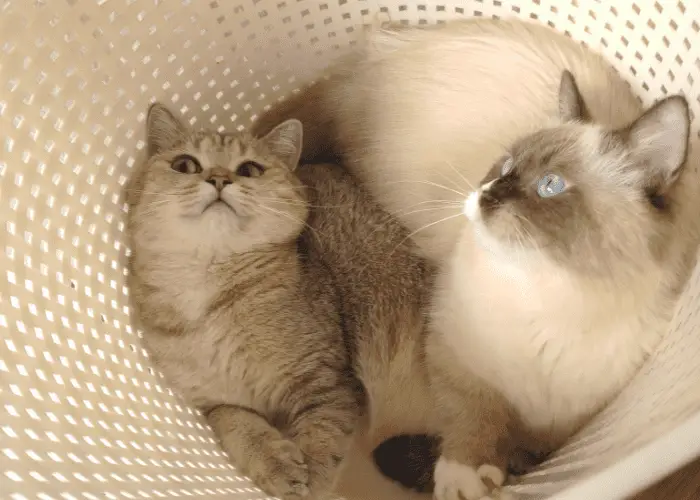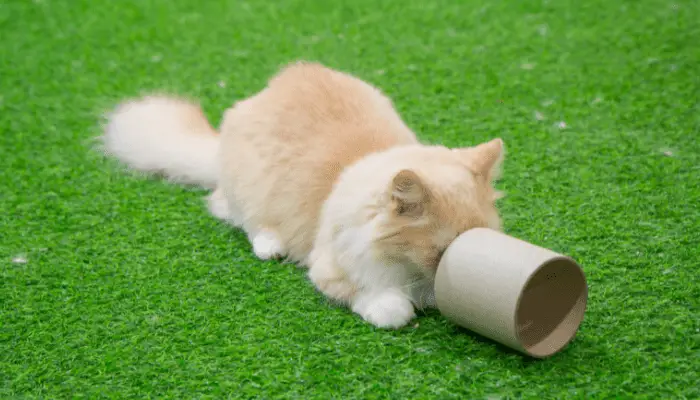The Daschund cat, the Weiner cat, or the midget cat- Munchkins go by many names. These dwarf cats may be short in stature, but they have more than enough personality to compensate!
As a general rule, Munchkin cats are very social and docile and therefore get along well with other pets and children. It is, however, essential to note that Munchkins should be kept indoors only and that they are less capable of escaping dangerous situations or aggressive pets.
The Munchkin is still a relatively new breed, and we are still learning a lot about the breed, its behavior, and the health conditions they are predisposed to. However, from the experience of Munchkin owners, breeders, and cat ethology researchers alike, this article aims to unveil some of the mysteries around this curious breed.

Where Did Munchkins Originate?
Munchkins have a genetic mutation causing dwarfism. In medical terms, it is called chondrodysplasia (sometimes also called achondroplasia) and causes stunted growth of long bones (primarily the front and hind legs).
Their front legs are often shorter than their hind legs, which causes an upward sloping back. The body, however, is not more petite in size compared to longer-legged cats.
There have been some accounts of short-legged cats in veterinary journals since the 1940s, but it was not until the 1990s that people started selectively breeding short-legged cats to produce the Munchkin breed.
The breed originated after a domestic shorthair cat gave birth to a litter of kittens, of which one had abnormally short legs. This kitten’s name was Blackberry, and she went on to produce a litter of kittens, of which half were born with short legs.
Blackberry was later bred to one of her male kittens to produce the litter of kittens from which most Munchkins descended.
Unfortunately, most breeds originate through breeding closely related relatives under the term ‘selective breeding’, which is one reason why purebred animals carry more genetic diseases.
Breeding 2 short-legged Munchkins will usually only result in around 50% of the litter having short legs. The kittens from a Munchkin litter with regular or ‘normal’ longer cat leg length are called ‘Munchkin Variants’ and look like normal non-dwarf cats.
This is because the dwarfism gene is dominant in cats, meaning they only need one copy of the gene to have short legs. Having two copies of these genes (inheriting one from each parent) is incompatible with life, meaning that embryos that inherited a copy of the dwarfism gene from both parents usually die before birth.
While most genetic mutations are not inherently bad (genetic mutation is the basis of evolution), breeding for a mutation that can potentially be harmful is not considered good breeding practice (this is specific to breeding animals – human genetics are a whole different story). This is one of the reasons why breeding Munchkins is seen as so controversial.
Some cat associations have accepted the Munchkin cat as a breed in the early 2000s; however, some international cat associations refuse to accept the Munchkin cat as a breed due to the controversy surrounding its breeding.
For the most part, Munchkins seem relatively healthy and do not carry the same risk for back conditions that, for example, dachshunds do. However, the breed-specific literature on Munchkins is still minimal at this point.
Munchkin Temperatment
Munchkins are incredibly social and affectionate. They love to play and can be mischievous at times. They seem to have the propensity to collect objects they value and hoard them and are sometimes lovingly referred to as Magpie cats.
Munchkins are sometimes even seen to perch on their hind legs like meerkats in order to get a better view of their surroundings.
Aggression is exceptionally uncommon in Munchkins except if they feel severely threatened, and they seem to keep a kitten-like temperament throughout their adulthood.

Are Munchkins Good With Kids?
Munchkins thrive in bigger households with lots of opportunities to play and be affectionate. Munchkins are great with children; however, younger children should be supervised as Munchkins are more prone to back injuries than other cat breeds.
Can Munchkins Get Along With Other Pets?
Munchkins are docile and social and usually have no problem getting along with other cats and dogs in the household. However, Munchkins should be kept indoors only, which can be difficult in multi-pet families. In addition, Munchkins should not be kept with aggressive cats and dogs as they are less capable of quickly escaping dangerous situations.
In general, it is recommended to keep Munchkins with other cats because they are so social and playful.
As long as a multi-phase introduction is followed when getting your Munchkin to maximize the likelihood of pets accepting and getting along with each other. Generally, kittens cope better with introductions to a new household than adult cats who do not come from multi-pet homes.
Another important note to remember is that Munchkins are not as quick and agile as other cats and, therefore, will be less capable of escaping dangerous situations. They can not jump as high and do not always land on their feet after falling.
It is recommended to keep your Munchkins indoors only. This is something that can be challenging in a household with multiple dogs or children or a home where other cats are allowed outdoors. I recommend checking out this article for more information on why Munchkins should be kept indoors and safe ways to allow them outdoors.
Munchkins need special litter boxes with a lower front and high sides – senior cat litter boxes work well. To read more about all the litter box considerations for Munchkins, please have a look at this article. Also, remember that the number of litter boxes in a multi-cat household should be the number of cats plus one.
Can Munchkin Be Kept Alone Or As The Only Pet?
Munchkins can be kept as single or only pets, provided that their owners are home most of the day and able to provide them with lots of attention.
Munchkins make good companions for the cat-loving elderly as long as they have access to lots of toys and areas to climb, such as a cat tree with a low entry or a window perch.
Similarly, Munchkins make great only pets for older children. As mentioned previously, younger children should be supervised as Munchkins are more prone to injuring their backs.
Environmental enrichment and stimulation are especially important for the Munchkin kept as an only pet. Because they need to be kept indoors and are so social and active by nature, their owners need to ensure that their Munchkin has ample opportunity to play to prevent behavioral disorders associated with boredom or frustration.
Cats kept as single pets are generally more prone to obesity due to being less active (less opportunity to play and chase) and also often being over-fed. Obesity can be detrimental to Munchkins due to their short legs and long backs.
Munchkins are prone to arthritis in their knees, elbows, and hips, and high body weight significantly exacerbates the progression of arthritis and subsequently arthritic pain.
So, as long as Munchkins that are kept as only pets are not overfed, kept active, and have ample opportunities to cuddle and play with their owners, they do exceptionally well kept as only pets.
Conclusion
Munchkins are social, docile, and playful and do great in homes with other pets and children. They can be kept as only pets as well, provided that their owners are able to provide them with ample attention and play-time.
Resources
- Goodman Milne, E., 2018. Time to stop accepting ‘normal for the breed’. Veterinary Record, [online] 183(20), pp.630-630. Available at: <https://www.proquest.com/openview/f1c1145faca78bc335257ebb61763e0e/1?pq-origsite=gscholar&cbl=2041027>.
- Gustafsson, K., 2015. Genetics ANd Phenotypes Of Chondrodysplasia (Achondroplasia) Across Domestic Animal SPecies. Szent Istvan University Faculty Of Veterinary Science Budapest, [online] Institute for Animal Breeding, Nutritional Laboratory Animal Science, Department of Veterinary Genetics and Animal Breeding. Available at: <http://www.huveta.hu/bitstream/handle/10832/1360/GustafssonKristinaThesis.pdf?sequence=1&isAllowed=y>
- Jezyk, P., 1985. Constitutional Disorders of the Skeleton in Dogs and Cats. In: C. Newton and M. Nunamaker, ed., Textbook of Small Animal Orthopaedics, 1st ed. [online] New York: International Veterinary Information Service. Available at: <http://citeseerx.ist.psu.edu/viewdoc/download?doi=10.1.1.463.1310&rep=rep1&type=pdf>
- L.A. Lyons, D.B. Fox, K.L. Chesney, L.G. Britt, R.M. Buckley, J.R. Coates, B. Gandolfi, R.A. Grahn, M.J. Hamilton, J.R. Middleton, S.T. Sellers, N.A. Villani, S. Pfleuger, Localization of a feline autosomal dominant dwarfism locus: a novel model of chondrodysplasia, the 99 Lives Consortium, bioRxiv 687210; Available at: <https://doi.org/10.1101/687210>
- Reid, C., Metz, S., Meny, R., Phillips, J., Francomano, C. and Pyeritz, R., 1984. RESPIRATORY PROBLEMS IN ACHONDROPLASIA. Pediatric Research, [online] 18, pp.402A-402A. Available at: <https://www.nature.com/articles/pr19841933>.
- Turner, D., Bateson, P. and Gordon, P., 2013. The Domestic Cat: The Biology of its Behaviour. Cambridge University Press.

